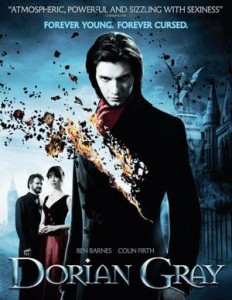 London – 1800s. A young man of perhaps 20, moves through the crowd with effortless grace on long slender limbs, drawing the eye of everyone in the room. Dorian Gray (Ben Barnes) has long beautiful straight hair framing a vertical pale white face with impossibly high cheekbones, thin pursed lips and two of the blackest eyes you will ever see.
London – 1800s. A young man of perhaps 20, moves through the crowd with effortless grace on long slender limbs, drawing the eye of everyone in the room. Dorian Gray (Ben Barnes) has long beautiful straight hair framing a vertical pale white face with impossibly high cheekbones, thin pursed lips and two of the blackest eyes you will ever see.
Dorian looks like the results of Cillian Murphy, Kevin Bacon and Hanson colliding at high speed and merging into one sort of perfect being, with all impurities and flaws destroyed in the collision.
The story opens as Dorian arrives ‘home’, though in truth he has not visited the family palatial manor since a child. Orphaned as a young child and raised elsewhere, Dorian moves home after the death of his grandfather – who if the scuttle is to be believed was not the finest of men.
Dorian however is still yet unmoulded and tainted by misfortune or cynicism. A well to do boy of privilege and high society with personal staff, money and no role to play on this earth. He is simply another of the upper class, though an especially pretty one.
This all changes at a posh soiree where Dorian is introduced to the two men who will shape his life, artist Basil and the polarising Lord Henry Wooton (Colin Firth). In the days and weeks that follow Basil becomes besotted with Dorian’s beauty, drawing and painting him as often as Dorian will permit, with one especially detailed portrait gifted to Dorian and adorning a prominent position in his own home.
Lord Harry however, is coarse, abrasive and aloof, openly detesting his own wife and deriding those closest to him openly. Harry immediately takes a shine to this unpolished young lad and decides he must be the one to mould him. The first lesson being “Conscience is just a polite term for cowardice”, followed closely by “the only way to defeat temptation is to yield to it”. Harry’s personal ethos is looking after himself, where others might live by the creed of ‘Seize the day’, Harry’s motto may well be ‘seize the ass… and the drugs… and whatever else brings fleeting pleasure…’
Harry leads Dorian into the gritty underside of society, further and further into depravity and self satisfaction, goading him through moments of pause and doubt with comments tantamount to schoolkids chanting ‘chicken’ to fearful kids not wanting to jump off the building.
He needn’t have bothered. Dorian leaps quickly and often. As the story evolves Dorian indulges every whim, not pausing to ponder ethics or morality, merely pleasing himself. Eventually though sex and debauchery isn’t enough to satiate him, and during an attempted ‘reality check’ Dorian lashes out to protect his chosen lifestyle.
Meanwhile his portrait seems to be gradually changing, initially in minor ways, but over time more noticeably…
The film charts Dorian’s arc from wide eyed young innocent to a hedonistic ‘anything goes’ 1800s Patrick Bateman, seemingly ageless, never learning a lesson or wasting energy on a facial expression. But if you’re a self centred prick intent only on a life of personal gratification at the expense of others, it is when that arc turns full circle that complications arise, especially as those that you have previously wronged reappear.
It takes a long while for Dorian to reason that ‘Pleasure is different to happiness’, but by then is it too late?
The problem with Dorian Gray is Dorian Gray, more specifically Ben Barnes. We – as everyone who comes into his orbit – are supposed to be fascinated by this enigmatic beauty even as we recoil at his reprehensible acts and lack of morals. Dorian’s sly charming smile is supposed to provoke wonderment and awe, but here only left me thinking ‘smarmy git’, and the rest of Barnes’ performance is as colourful and bright as his character’s jet black eyes.
Colin Firth fares a little better as Dorian’s self elected coach who eventually realises that his charge is beyond his influence and farther embroiled in the lifestyle than anyone ever dreamed, but his role as Harry is poorly drawn after the first hour of the film and he becomes merely another shocked bystander.
This makes Harry just another viewer who, like us, becomes more puzzled and annoyed than horrified and forever changed.
Final Rating – 6 / 10. As a film Dorian Gray is similarly pale and lifeless as the titular character. A middling effort, embracing neither horror nor bold social commentary, it is more a standard cautionary tale about excess that dabbles in a few fantasy and horror elements. A tale told many times previously, and not told well enough here to differentiate it from the pack.
